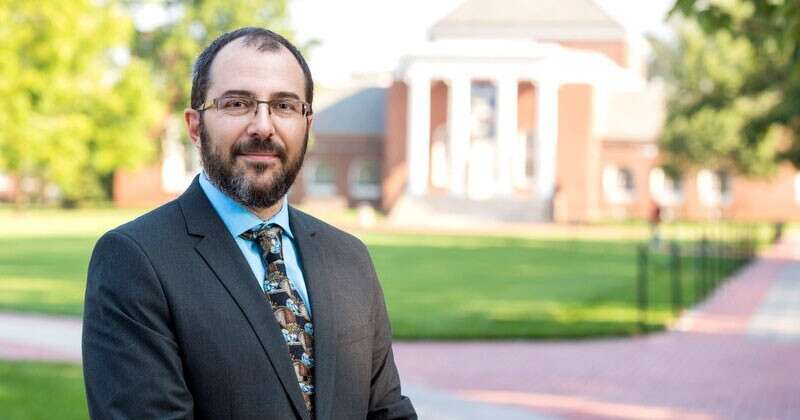
Fabrice Veron named dean of College of Earth, Ocean and Environment
Fabrice Veron, interim dean of University of Delaware’s College of Earth, Ocean and Environment (CEOE), has been named dean of the college, effective immediately, University President Dennis Assanis and Provost Laura Carlson announced today.
“I am grateful for Fabrice’s dedicated leadership as interim dean since August 2021 and excited that he will continue his outstanding service to the college and the University,” Assanis said. “Fabrice is a well-respected scholar, valued colleague and proven campus leader. His extensive experience will help the college continue to enhance its academic excellence, while contributing to the University’s commitment to sustainability and its stewardship for our environment.”
The College of Earth, Ocean and Environment is dedicated to advancing the understanding of Earth’s natural systems and human interaction through research, teaching and outreach. UD students and scientists study environmental science, marine science, human and physical geography, geology and meteorology and climatology. In addition to its presence on the Newark campus, the college also operates at the Hugh R. Sharp Campus, located on the Delaware Bay in Lewes.
“CEOE provides critical leadership in the University’s response to the issues surrounding climate change and sustainability in Delaware, and around the globe,” Carlson said. “Fabrice knows the college well and is uniquely poised to move the college forward by leveraging its strengths while also cultivating its cross-college connections.”
A member of the CEOE faculty since 2002, Veron served as deputy dean in the college from 2017 until 2021, when he stepped into the interim dean role. He is a professor in physical ocean science and engineering in the School of Marine Science and Policy, and he serves as director of the Air-Sea Interaction Laboratory.
“I am truly honored to take on this leadership position in the College of Earth, Ocean and Environment,” Veron said. “Our college is at the leading edge of education and research on coupled natural and human systems. Today’s global problems — such as climate change, globalization and migration, marine pollution, energy independence, watershed degradation and fisheries decline — demand expertise in several disciplines. Our research portfolio and engagement with local, regional and global partners reflect this reality. And our curriculum prepares well-rounded physical-, life- and social-scientists with the in-depth knowledge and the broad vision needed to meet these challenges.
“I look forward to working with the college community, President Assanis, Provost Carlson and other colleagues at UD to enhance our students' educational experience, to continue to pursue exciting discoveries, deliver impactful research and advance the mission of the University.”
About Fabrice Veron
During Veron’s tenure as interim dean, the college admitted its largest undergraduate class in fall 2022 and created new multidisciplinary programs in response to market demands in such areas as environmental economics, environmental science and management, climate change and sustainability. Earlier this year, with a $1.3 million grant from the National Oceanic and Atmospheric Administration (NOAA), the college launched Project Align, Build, Leverage and Expand (Project ABLE), a collaboration between Delaware State University and the UD Center for Autonomous and Robotic Systems.
Veron studies how the ocean and the atmosphere are connected, specifically small-scale air-sea interactions. His work involves experiments on breaking waves and related phenomena, such as the injection of turbulence and bubbles in the water columns or the ejection of sea spray in the airflow.
Funding for Veron’s research has come from the National Science Foundation, the Department of Energy, the Office of Naval Research and the National Oceanic and Atmospheric Administration, among others. In addition, he is the author of numerous articles in highly respected, peer-reviewed journals and has made presentations at conferences around the world.
Veron came to UD as an assistant professor in 2002 to direct the Air-Sea Interaction Laboratory in the School of Marine Science and Policy. He was promoted to associate professor in 2008 and full professor in 2016. From 2010-17, he served as program director for physical ocean science and engineering in the school, and he co-chaired the college’s strategic planning committee in 2018-19.
He holds bachelor’s and master’s degrees from the University of Bordeaux in France and earned his doctorate in oceanography at Scripps Institution of Oceanography at the University of California, San Diego.
A member of the American Geophysical Union, the American Physical Society and the American Meteorological Society, Veron serves on the board of the Delaware Museum of Nature and Science and on the President’s Advisory Committee on University Relations for the National Center for Atmospheric Research/University Corporation for Atmospheric Research.
About the College of Earth, Ocean and Environment
The study of environmental, earth and ocean systems is a vital part of ensuring a healthy future for our planet and all its inhabitants. The College of Earth, Ocean and Environment (CEOE) provides exemplary instruction with the goal of preparing students for meaningful careers in education, research, business or government service. CEOE is made up of three academic units — the School of Marine Science and Policy, the Department of Earth Sciences and the Department of Geography and Spatial Sciences — with 60 core faculty members. Three research and outreach units within the college bring environmental science to public applications: Delaware Sea Grant, the Delaware Geological Survey, and the Center for Environmental Monitoring and Analysis. In addition, CEOE hosts a number of other specialty centers, such as the Center for Research in Wind and the Delaware Center for Geographic Education.

